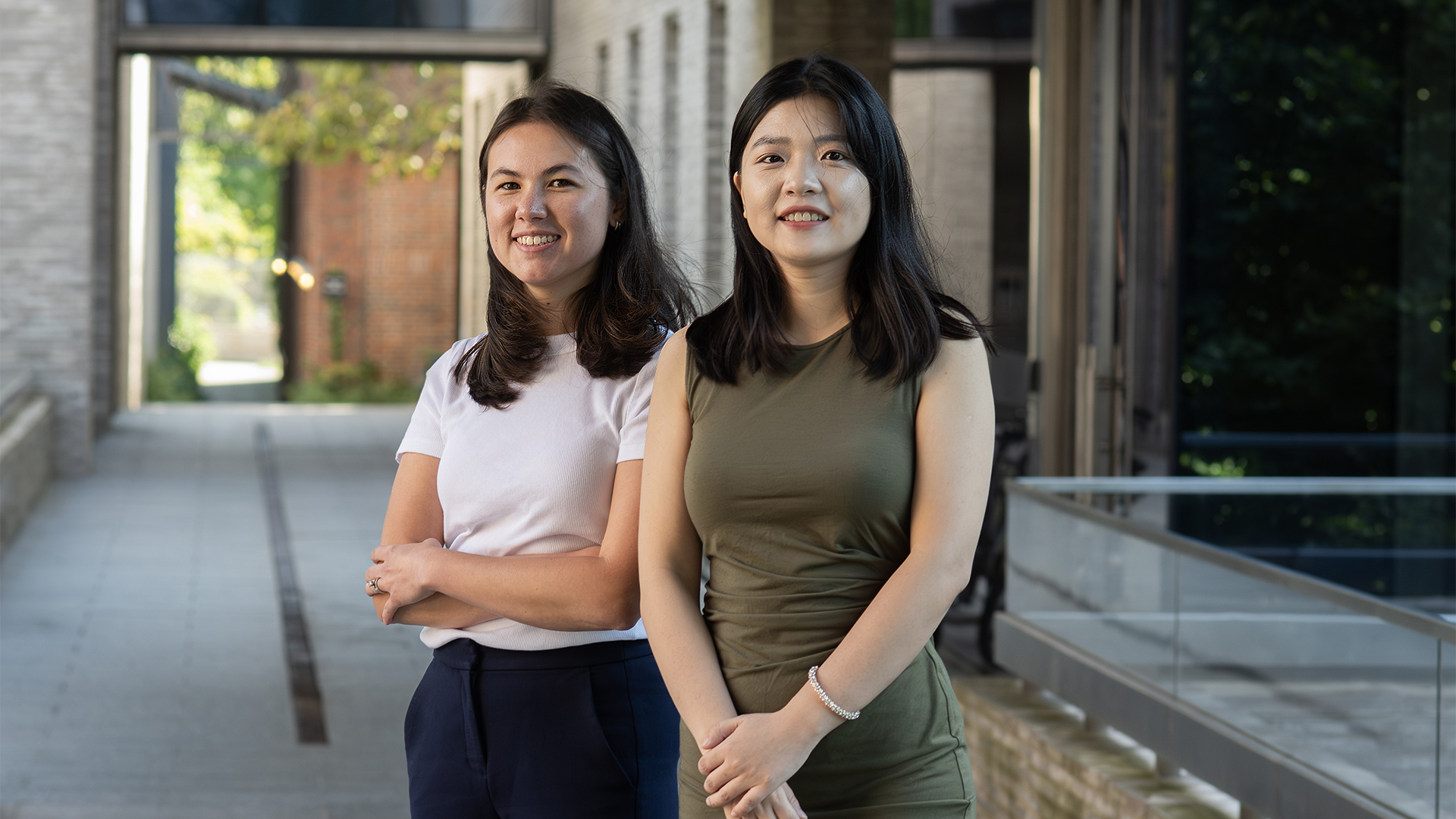
Distinguished Postdoctoral Fellows develop stable insulating polymers and origami-inspired robots
In summer 2024, Amy Honnig Bassett and Yifan Rao joined Princeton’s Andlinger Center for Energy and the Environment as its newest Distinguished Postdoctoral Fellows. Their respective research focuses will be designing electrically insulating polymers with high thermal stability and developing modular, origami-inspired robots with improved energy efficiency that can help humans complete tasks ranging from environmental-scale monitoring to micro-robotics.
Amy Honnig Bassett: Electrically insulating polymers with high thermal stability

Honnig Bassett will work with Emily Davidson, assistant professor of chemical and biological engineering, and Rod Priestley, the Pomeroy and Betty Perry Smith Professor of Chemical and Biological Engineering, to develop thermally stable, electrically insulating polymers for uses in energy storage and power electronics.
There are many cheap and widely available polymers that can act as dielectrics — insulating materials used in many power management devices to prevent short circuiting. However, most of them have poor performance and stability at elevated temperatures, which can lead to potentially dangerous failures in high-temperature applications like electric vehicles and power electronics. While some researchers have attempted to raise the temperature stability of these dielectric polymers, improvements have often come at the expense of their overall performance and ability to withstand high voltage conditions.
Through her work, Honnig Bassett seeks to design dielectric polymers with both high thermal and electrical stability. Focusing on a class of polymers known as polyimides, she will develop materials with the right balance of performance, stability, and processability to broaden the polymers’ role in the transition to clean and renewable energy.
“It’s interesting to be able to use and manipulate chemistry in very specific ways to obtain the properties that you’re after,” Honnig Bassett said. “I enjoy the challenge of combining my chemistry and engineering knowledge to design materials that behave in the way we want them to.”
At Princeton, Honnig Bassett will draw from her graduate research at Rowan University developing resins with high temperature resistance for use as flame retardants. She will combine this background with the expertise of the Davidson and Priestley labs in polymer synthesis and characterization to explore the molecular design of new polymers with the desired set of properties.
Honnig Bassett said she looks forward to engaging with the Andlinger Center community during her fellowship to broaden her perspective, expand her technical expertise, and build soft skills, such as mentoring students and preparing grants, to prepare herself for her own future research lab. Engaging with the research community, she said, is also a way to exchange new ideas and form collaborations that can ensure her work has meaningful impacts.
“There are faculty working on energy storage, but maybe they’re looking at a different side of the problem than I am or addressing it in their own way,” Honnig Bassett said. “If we can combine our perspectives and learn from each other, we could end up creating a better product.”
Yifan Rao: Modular, origami-inspired robots

Rao will work with Glaucio Paulino, the Margareta Engman Augustine Professor of Engineering, and Minjie Chen, associate professor of electrical and computer engineering and the Andlinger Center for Energy and the Environment, to develop optimal energy embedding strategies for modular, origami-inspired robots, with applications ranging from environmental-scale monitoring to micro-robotics.
Soft robots based on origami structures have numerous advantages over existing soft robotic systems. Their origami-inspired designs are easy to reconfigure, enabling greater flexibility and allowing them to be quickly tuned for new applications. Their modular construction also makes them easy to customize as well as straightforward to repair and replace with minimal waste. Moreover, their lightweight nature means they are ideal candidates for energy efficient robotic applications.
At Princeton, Rao has already developed prototypes to demonstrate the high adaptability and modularity of origami-inspired designs, but her current structures require manual operation to compress and reform. During her fellowship, Rao will merge Paulino’s specialty in the mechanics of materials and structures with Chen’s expertise in power electronics to develop integrated mechanical, electrical, and magnetic systems for rapid and remote control of these origami-inspired systems.
“There are many challenges in co-designing the mechanical, electrical, and magnetic systems from both the theoretical and applied perspectives,” said Rao. “On the theoretical side, we will work to establish a framework for understanding how the integrated system behaves and how we can achieve greater control. And at the same time, we will directly test the system to identify some of its most promising applications.”
According to Rao, such applications span a wide range of scales, from large systems that could aid in monitoring and repairing environmental damage all the way to micro-scale systems that could be used for drug delivery. Yet the most exciting part of the work, Rao said, is not the performance of the origami-inspired robots in any single scenario, but rather their ability to achieve precise feedback control and optimal energy efficiency across various modes of actuation.
“In the end, I want to explore how we can use these robots to help humans have a better life,” Rao said. “By investigating optimal energy embedding strategies, we aim to address challenges from healthcare to environmental conservation, ultimately improving overall well-being.”
Her work at Princeton marks a new direction for Rao, who earned her Ph.D. in Engineering Mechanics from the University of Texas at Austin, focusing on the mechanics and nanomaterials of bio-integrated electronics. During her graduate studies, she engaged in interdisciplinary research in flexible electronics that taught her how to integrate the mechanical and electrical characteristics of advanced functional materials to achieve desired performance outcomes, which she will leverage during her time as a Distinguished Postdoctoral Fellow.
The goal of the Distinguished Postdoctoral Fellowship program is to attract promising doctoral graduates who will accelerate important areas of energy and environmental research. Applications for the next cycle of Distinguished Postdoctoral Fellows are currently open until October 4, 2024.
Honnig Bassett’s and Rao’s fellowships were supported by the Gerhard R. Andlinger Innovation Fund, the Lewis W. van Amerongen ’62 Fund for Energy Research, and the Gregory H. Olsen Postdoctoral Fellowship Fund.
Related articles:
- Distinguished Postdoctoral Fellows study social systems and analyze atmospheric dynamics
- Distinguished postdoctoral fellows to leverage new technology to achieve net-zero and develop energy smart ceramics
- Overcoming clean energy opposition and catching tiny microplastics in water are themes of research by newest Distinguished Postdoctoral Fellows